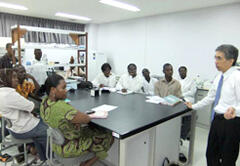The Studies of Anti-viral and Anti-parasitic Compounds from Selected Ghanaian Medicinal Plants
Principal Investigator
-


Prof.
Graduate School of Medical and Dental Sciences, Tokyo Medical and Dental University
YAMAOKA Shoji
ODA Recipient Country
Republic of Ghana
Research Institutions in Japan
Tokyo Medical and Dental University / Nagasaki International University
Research Institutions in Counterpart Country
Noguchi Memorial Institute for Medical Research (NMIMR) / Center for Scientific Research into Plant Medicine (CSRPM)
Adoption fiscal year
FY 2009
Research Period
5 Years
Overview of the Research Project
Finding substances in Ghanaian herbs that are effective against infectious diseases
Understanding and availability of advanced healthcare are still limited in Ghana, and lack of modern therapies is driving the spread of HIV, malaria, and other diseases. To address this problem, we are seeking to isolate substances effective in suppressing the replication of viruses and multiplication of parasites from herbs native to Ghana that have been traditionally used as therapies for infectious diseases. We aim to develop sustainable therapies tailored to Ghana's circumstances by elucidating the mechanisms by which beneficial substances exert their effects.
Effective substances successfully extracted from herbs
We have found several herb extracts that are useful in HIV infection control, and have also pinned down active components capable of suppressing the proliferation of Trypanosoma parasites. The next step is to aim for drug development, including evaluating these components in animal studies and elucidating their working mechanisms. As we do this, we will proceed with technology transfer, in order to ensure that research and development capacities become established and can grow.
Photo gallery
Research Project Web site
Press Release
Links
Projects
Contact Us
Japan Science and Technology Agency (JST)
Department of International Affairs
SATREPS Group
TEL : +81-3-5214-8085
Related articles by Category
- Infectious Diseases Control
Infectious Diseases Control

 Kingdom of Thailand
Kingdom of Thailand
Helping Tuberculosis Patients: Strengthening TB Control Strategies through Genomic Analysis!
Integrative Application of Human and Pathogen Genomic Information for Tuberculosis Control
- Ghana
Environment / Energy
(Global-scale environmental issues)
 Republic of Ghana
Republic of Ghana
The Ghana Model: Creating Resilient Communities that Cope with Extreme Climate and Weather Events
Enhancing Resilience to Climate and Ecosystem Changes in Semi-Arid Africa: an Integrated Approach
- Africa
Environment / Energy
(Global-scale environmental issues)
 Republic of Zambia
Republic of Zambia
Experienced, not taught - Realizing safe water, sanitation and hygiene in Africa
Risk-based Participatory WASH Planning and Citizen-data WASH Statistics for African Peri-urban Settlements
- SDGs : Goal.3
Environment / Energy
(Global-scale environmental issues)
 Kingdom of Cambodia
Kingdom of Cambodia
Develop human resources to solve air pollution problems in Cambodia! Observation, analysis then countermeasures
Establishment of Risk Management Platform for Air Pollution in Cambodia



















